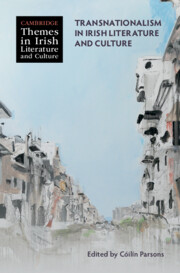Book contents
- Transnationalism in Irish Literature and Culture
- Cambridge Themes in Irish Literature and Culture
- Transnationalism in Irish Literature and Culture
- Copyright page
- Contents
- Acknowledgments
- Contributors
- Introduction: A Weak Theory of Transnationalism
- Part I Transnational Genealogies
- Part II Planets
- Chapter 6 Stargazing in Joyce and Walcott: Navigating Colonial Entanglements with Asterisms
- Chapter 7 Ireland, Literature, and the Blue Humanities
- Chapter 8 You Have Gas: Reading for Irish Energy
- Chapter 9 “Unbearably Intimate Connections”: Contemporary Irish Poetry and the Planet
- Part III Missed Translations
- Part IV Transnational Futures
- Select Bibliography
- Index
Chapter 7 - Ireland, Literature, and the Blue Humanities
from Part II - Planets
Published online by Cambridge University Press: 13 November 2024
- Transnationalism in Irish Literature and Culture
- Cambridge Themes in Irish Literature and Culture
- Transnationalism in Irish Literature and Culture
- Copyright page
- Contents
- Acknowledgments
- Contributors
- Introduction: A Weak Theory of Transnationalism
- Part I Transnational Genealogies
- Part II Planets
- Chapter 6 Stargazing in Joyce and Walcott: Navigating Colonial Entanglements with Asterisms
- Chapter 7 Ireland, Literature, and the Blue Humanities
- Chapter 8 You Have Gas: Reading for Irish Energy
- Chapter 9 “Unbearably Intimate Connections”: Contemporary Irish Poetry and the Planet
- Part III Missed Translations
- Part IV Transnational Futures
- Select Bibliography
- Index
Summary
The modern idea of Ireland as a nation-state formed from the break-up of empire in partition and decolonization proceeds from concepts of place and belonging that are largely territorial and landed. The recent centenaries of partition and the civil war have shown how little we thought of those literary works that expressed the diversity of life in the fractures between state and nation. This chapter asks how we might think more carefully now about the peripheral and the marginal as cultural registers of a contemporary experience that is historicizable in newly fluid ways. In one sense, this practice builds on decades of historicist and postcolonial criticism. In another, it relates to conversations going on in other parts of the academy, where terms like the Global South are being rethought in terms of their oceanic, and their cultural, futurity.
- Type
- Chapter
- Information
- Transnationalism in Irish Literature and Culture , pp. 135 - 150Publisher: Cambridge University PressPrint publication year: 2024

